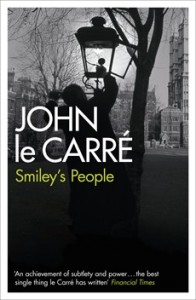March 7, 2014
The real life George Smiley wasn’t happy with his portrayal
by Martin Rouse
 MI5 agent John Bingham is cited as inspiration for John le Carré’s iconic spy George Smiley—a character boasting wildly successful turns in novels, TV, and films—but it turns out that he wasn’t a fan. Newly released papers from Bingham’s life show that, not only did he dislike his by-proxy fame, but that he “deplored” the way le Carré portrayed it.
MI5 agent John Bingham is cited as inspiration for John le Carré’s iconic spy George Smiley—a character boasting wildly successful turns in novels, TV, and films—but it turns out that he wasn’t a fan. Newly released papers from Bingham’s life show that, not only did he dislike his by-proxy fame, but that he “deplored” the way le Carré portrayed it.
“You are far from being pro-Soviet or pro-communist,” Bingham wrote in an October 1979 letter to him, as if to suggest that le Carré is not not a communist, “but I would think the attacks gave comfort and even pleasure and glee [to such people] in some places.”
These “attacks” refer to le Carré’s depictions of M15 (called the “circus” in his novels), which do not shy away from portraying British intelligence in a bad light. For example, The Telegraph notes that le Carré once dared to label British agents as game-playing “fantasists” and closeted homosexuals—an accusation that the straightforwardly patriotic Bingham would not abide (“your favourite ‘homosexual fantasist'” he signed the above letter, in cheeky response).
Lacking the empathy to understand that communists could really use some additional glee in their lives, Bingham’s papers are full of criticisms of le Carré for indirectly supporting their cause. Perhaps because Bingham had once been le Carré’s respected mentor in both spying and fiction writing, these accusations are somewhat restrained (le Carré is “a basically patriotic sort of man” he concludes in the transcript of a conversation with his wife, as opposed to “basically a commie”). And, much of his critique is phrased like cool-headed advice to le Carré, such as: British intelligence feels really bad when depicted as “a lousy lot of inefficient no-goods.”
Bingham’s wife, however, felt no such obligation to play nice. According to Bingham’s biographer Michael Jago, “Bingham was disappointed [in le Carré], but Madeleine was bitter and enraged. She was wild with envy. Her husband had given all this time to MI5, since 1940, while le Carré had been in only a couple of years and gone off and written about it and become an expert on the world of espionage.” She penned the book Smiley’s Wife and the drama Smelly’s People (a play on the title of le Carré’s Smiley’s People) as scathing attacks on the author, though neither of them were published.
In the wake of all this vitriol, le Carré has been composed and understanding. In a letter published in The Telegraph, he writes:
I had, and shall always have, unqualified admiration for his intelligence skills and achievements. . . But Bingham was of one generation, and I of another. Where Bingham believed that uncritical love of the Secret Services was synonymous with love of country, I came to believe that such love should be examined. And that, without such vigilance, our Secret Services could in certain circumstances become as much of a peril to our democracy as their supposed enemies.
Perhaps le Carré, in reading these documents, feels the same attraction to Bingham that readers feel to George Smiley today. If anything, these papers reveal just how much Bingham actually resembled the character he inspired. Disciplined, patriotic, and stubborn: through papers of John Bingham, George Smiley is born again.